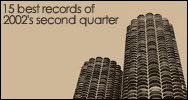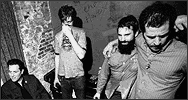|
|
|
| archive : A B C D E F G H I J K L M N O P Q R S T U V W X Y Z | ||||
|
| ||
 Jeff Buckley
Jeff BuckleyLive a L'Olympia [Columbia, UK; 2001] Rating: 8.3 Many religions prescribe time for meditation. It's a concept I'm sort of attracted to. I've even attempted some of the traditional methods, but I always get distracted: my foot falls asleep, my ass starts hurting from being sat on all weird, or I have intense, apocalyptic visions like the ones in Ken Russell's Altered States. (Incidentally, being transformed into a cro-magnon and busting into a zoo in the dead of night to consume live bovine is highly overrated.) I'm not really sure why I attempt to put myself through such torture, though, when I know that music can provide the obliteration of surroundings I seek. Jeff Buckley is always there for me. The first ten tracks from Buckley's second officially released live album, Live a L'Olympia, are culled from two shows that took place on July 6th and 7th in 1995, almost a year after the release of Grace. The recordings are sourced from an analog audio cassette that was found among Buckley's possessions after his death. For a major label concert release, there's a high amount of noise present, but this is significantly outweighed by the quality of the performances documented. The liner notes call these shows "high points of [Buckley's] performing career," a fact that's quite apparent in the material, which is by and large pretty stunning stuff. Such is the case with the two songs that open the album, "Lover You Should've Come Over" and "Dream Brother." Buckley's band are a focused and tight bunch who can only complement Buckley's ecstatic falsettos. Both tracks exceed seven minutes in length, yet there's not a second lacking in energy. Buckley begins the verse of "Dream Brother" with a barely audible, steadily repeating guitar note that builds to a reverbed crash as he hammers the pickup. The arrangement isn't very distant from the performance on last year's Mystery White Boy, but this recording seems somehow more poignant. Then there's "Eternal Life," and the cover of the MC5 classic, "Kick Out the Jams," while expose Buckley's subtle death metal leanings, allowing them to gawkily escape into the open. I doubt the fans are looking for more of that after the version of the former song on Mystery White Boy. Then again, I've always preferred the more minimal Live at Sin-E version of the song to Grace's studio version. Which leads me to the only problematic flaw of L'Olympia: at times, the live energy defies capture on tape, and at others, it actually interrupts the performances. Buckley stops in the middle of both "Je N'en Connais pas la Fin" and "Hallelujah." On the latter, he even asks the audience if they want him to finish the song. When heard, the question seems to be an angry retort to an impolite audience, but according to a statement made by Buckley's mom in the liner notes, Jeff was reveling in the support of his audience-- something that was relatively new to him at the time of this recording. The audience joins in to sing "Hallelujah." Buckley proclaims, "This is so rock and roll," and proceeds to sing harmony with his active audience. But while this would have been an astounding experience in person, the recording doesn't capture much of the audience, and some of Buckley's complementary vocal lines seem awkward. Later, the disc concludes with a soundboard recording of "What Will You Sa," recorded at 1995's Festival of Sacred Music, which was held in a small village in western France. Here, Azerbaijani singer Alim Qazimov adds vocals and plays tabla, with Buckley occasionally mimicking Qazimov's middle-eastern vocal turns, making it a uniquely engaging track in Buckley's live oeuvre. Live a L'Olympia hasn't yet been issued domestically, and it isn't listed on Columbia's American release schedule. For Buckley fans, I personally consider "What Will You Say" to be worth the hassle of an international order. And if you care to sing along, Jeff will harmonize. You might just forget where you are. -Christopher F. Schiel, October 2nd, 2001
|
||





